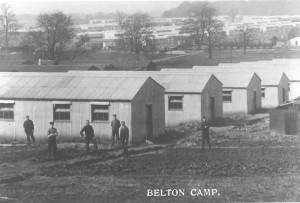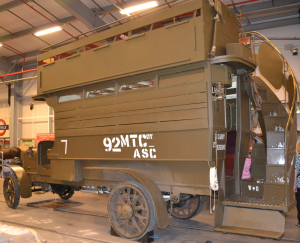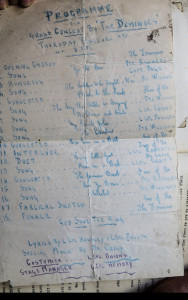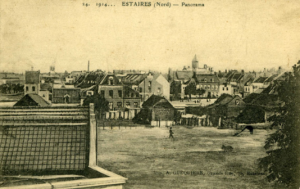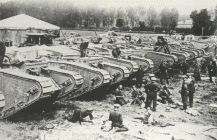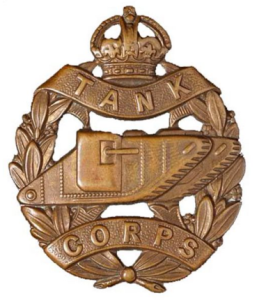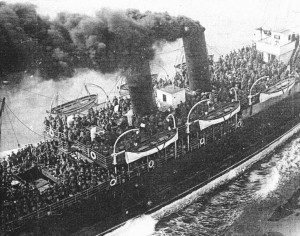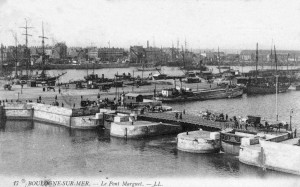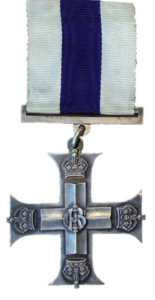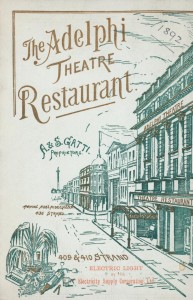20th February 1918 Wednesday to 2nd March 1918 Saturday
The School of Instruction
All material produced or reproduced here and throughout this work is the sole copyright of the author and the family of Doctor D.C.M. Page MC.
“On the 20th Feby I was packed off by car to the 1st. Army R.A.M.C. School of Instruction at Bruay, near Bethune. There were about 40 R.A.M.C. officers, including 10 Americans at the School, and we all slept in a large wooden hut on good hospital beds.
Each morning we were up at 7 o’clock, and had a course of physical jerks before breakfast. It was great fun, and I enjoyed this part of the day’s programme very much.”
From Wednesday 20th February until Saturday the 2nd March Douglas attended the RAMC School of Instruction at Bruay, just south west of Bethune. Unusually for his diary, he goes into a lot of detail about the instruction he received about medical matters. We will go into the events in more detail in any printed version of this diary. Suffice to say for now that the men spent their spare or non-study time doing physical exercise, route marches or on horse riding exercises, sometimes just going for a ride together.
Bethune had been an important behind the lines centre for British and Allied troops since the beginning of the war, but the time for Bethune was running out. It was soon to be almost totally destroyed in the forthcoming Kaiser’s “Spring Offensive”, or “Operation Michael”.
“The 24th Feby. was a Sunday, and we had Church Parade at 11 a.m. In the afternoon eight of us went out on horses for some fresh air, and had a great time.”
“On the morning of Saturday, March 2nd (my birthday) there was a terrific bombardment. We found out later that the Germans had attacked the Portuguese, and broken through, but that the ‘Geese’ or ‘Pork and Beans’ assisted by our 42nd Division had driven the enemy back again.
That same afternoon I returned to L’Estrude after a very pleasant and instructional week at Army H.Q.”
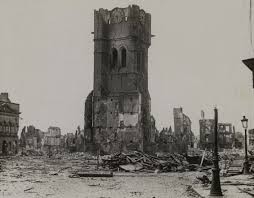
The fate awaiting Bethune after the German Spring Offensive of 1918. Photo via Creative Commons http://www.wikipasdecalais.fr/index.php?title=Fichier:Béthune_beffroi_1918_4.jpg
Find out about our connection with Dr Page and an introduction to his diary here
18th February 1918 Monday
Back to the 130th and a comfy billet
All material produced or reproduced here and throughout this work is the sole copyright of the author and the family of Doctor D.C.M. Page MC.
“I was relieved on the 18th, and went back to the 130th Field Ambulance at L’Estrade. I found them all comfortably situated in a big farm-house. Captain Burke and I shared an Armstrong Hut, and were very comfy.”
There were various developments of the Armstrong Hut. It was a hut usually constructed of wood. They could also have canvas sides and/or corrugated steel sides and roofing.
Find out about our connection with Dr Page and an introduction to his diary here
13th and 14th February 1918 Wednesday and Thursday
Return to Desalanque Farm
All material produced or reproduced here and throughout this work is the sole copyright of the author and the family of Doctor D.C.M. Page MC.
“On the 13th February we left in motor buses for Erquinghem and got a great send-off from the inhabitants of Estaires. At night we went into the trenches at Desalanque Farm relieving one of the King’s Own Liverpool Battalions of the 57th Division. Rather a distressing accident happened in ‘C’ Company next day. A boy of 19 was cleaning his officer’s revolver, when it went off hitting another man in the head and killing him.”
Douglas was no stranger to Desalanque Farm having been there with the 13th RWF from September ‘17 and now finds himself back with the 17th RWF.
Before the outbreak of war in 1914, Londoners had witnessed the introduction of new motor buses. These replaced the London General Omnibus Company’s horse buses from 1910, the last one being withdrawn in 1911. In the next three years over 2500 motor buses had been introduced. During the Great War a total of 954 B type buses had been requisitioned for service on the Western Front from Flanders to the Somme, many being returned to service in London at the cessation of hostilities.
The Regimental diary of the 17th only refers to the men involved in the tragic accidental shooting as 1 other rank killed by 1 other rank, unfortunately no names being mentioned.
Find out about our connection with Dr Page and an introduction to his diary here
7th February 1918 Thursday
All material produced or reproduced here and throughout this work is the sole copyright of the author and the family of Doctor D.C.M. Page MC.
“On Feb 7th, the ‘Dominoes’ Concert Party gave a great concert in the hall. It was a great success. The place was packed to overflowing, and many were turned away. There were a lot of officers, British nurses and French civilians and the audience was most appreciative – everything went off without a hitch, and all the gags went down well. Driver Croly was splendid at the piano, and the stage hands did well too.”
Driver Croly is credited at the bottom of the programme for composing some of the music for the concert.
Here’s a link to view a contemporary period concert party. Please do not be distracted by the attractive ladies in the centre of the group as they are probably not quite what they seem. https://www.britishpathe.com/video/soldiers-concert-party
Find out about our connection with Dr Page and an introduction to his diary here
31st January 1918 Thursday
Dazed and Distended and a Pretty Girl!
All material produced or reproduced here and throughout this work is the sole copyright of the author and the family of Doctor D.C.M. Page MC.
The lady and gentleman in whose house I was billeted gave the Colonel and I a lunch one day. It was a great feast consisting of oysters, fish, beef and vegetables, sweets and coffee. We also had countless wines thrust upon us, beginning with Sauterne, and following on with Burgundy, Bordeaux, Beer, Champagne, Liqueurs and Gin! I felt rather dazed and distended after it all. Some music followed, and then tea was served! I left about 5.30 p.m. after about five hours of continuous feasting! The three daughters of our host and hostess were present also. One was rather pretty.
On the 31st January I was sent to the 17th Royal Welsh Fusiliers to act as their medical officer, whilst their regular man was on leave. The Battalion was stationed in Estaires, so that I was quite close to the Ambulance.”
It was like home from home and a life that he had become very used to away from the comforts of life in Edinburgh. Life on the Western Front was never going to be a holiday, but men will make the best of any situation. Nevertheless life could sometimes have seemed a little bizarre. One moment you were dodging a shrapnel shell or shaking with fear under attack by gas or being bombed from above. Next thing, for those lucky enough, you could be being wined and dined in the parlour of a sympathetic host with some attractive daughters to distract your attention.
Find out about our connection with Dr Page and an introduction to his diary here
18th January 1918 Friday
A long day back to duty.
All material produced or reproduced here and throughout this work is the sole copyright of the author and the family of Doctor D.C.M. Page MC.
Douglas set out on the laborious journey back to the French Western Front to meet up once more with the 130th (St.John) Field Ambulance in Estaires, much to his personal satisfaction.
Tanks had begun to gather just outside St. Pol which became an important point in the deployment of tanks and was the scene for a later policy of deceiving the Germans into thinking the Tank Division was larger than it really was.
After putting up a good show during the preliminary battles leading up to the Passchendaele offensive, particularly at Pilkem Ridge, the 38th Division had gone a long way to restoring its reputation among the army hierarchy. Suffering enormous losses at the Somme with the fight for Mametz Wood, Haig put it down very unfairly to lack of endeavour. The 38th were withdrawn from the main offensive in September 1917, being used to take up new positions in the area around Armentieres. Then given time to rest and train before taking up fighting positions once more in February 1918.
Find out about our connection with Dr Page and an introduction to his diary here
17th January 1918 Thursday
Douglas’s consoling second breakfast indicates that he may have caught the Pullman again. No such luxuries a hundred years on, he may have been lucky to find a refreshment trolley serving a sandwich and something masquerading as a cup of coffee. Of course even boat trains to the now defunct Folkestone Harbour are a thing consigned to history, superseded by the Channel Tunnel.
Find out about our connection with Dr Page and an introduction to his diary here
16th January 1918 Wednesday
The King honours Douglas but Mother is left out in the cold
All material produced or reproduced here and throughout this work is the sole copyright of the author and the family of Doctor D.C.M. Page MC.
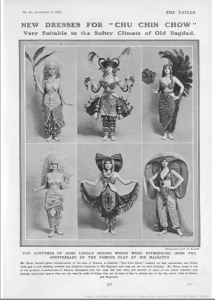
The Tatler – Wednesday 12 September 1917
Image © Illustrated London News Group. Image created courtesy of THE BRITISH LIBRARY BOARD. https://www.britishnewspaperarchive.co.uk/
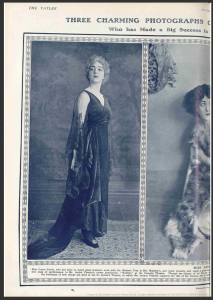
The Tatler – Wednesday 23 May 1917 Image © Illustrated London News Group. Image created courtesy of THE BRITISH LIBRARY BOARD. https://www.britishnewspaperarchive.co.uk/
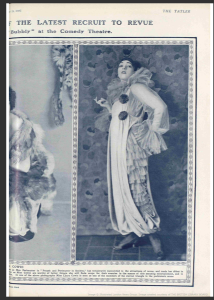
The Tatler – Wednesday 23 May 1917 Image © Illustrated London News Group. Image created courtesy of THE BRITISH LIBRARY BOARD. https://www.britishnewspaperarchive.co.uk/
Finally the day of Douglas’ great honour had arrived and his mother Elizabeth and himself proudly set off in a taxi for Buckingham Palace sadly for his mother to be denied access by the protocol of the day.
Nonetheless I am absolutely sure that she would have been glowing with pride that her son had got to meet the King and be honoured in such a way.
Following lunch at Morley’s and the show in the Haymarket he doesn’t mention what happened to his mother following that but one would assume that as he was again out to dine with a colleague in the evening that she had been suitably despatched back to Kings Cross and home to Scotland.
Douglas mentions that ‘Chu-Chin-Chow’ was a wonderful show but from reading about some of its content it may not appear an obvious one to take your mother to as the cast included scantily clad slave girls. However the Pages’ visit may have been after that of the Lord Chamberlain where the ‘naughtiness’ was ordered to be toned down. Chu-Chin-Chow along with the Bing Boys was one of the great successes of the War years. It ran for over 5 years with 2238 consecutive performances. This record was held for almost 40 years until it was overtaken by Salad Days in the 1950s.
Find out about our connection with Dr Page and an introduction to his diary here
14th January 1918 Monday
Time off for Douglas in Perth, Edinburgh and London
All material produced or reproduced here and throughout this work is the sole copyright of the author and the family of Doctor D.C.M. Page MC.
“Everybody was in great form at home, and the time soon sped by with visits to friends, theatres, etc., and a flying visit to Perth where I attended a concert and dance at the War Hospital.
Great crowds were to be seen daily at the Mound, where ‘Julian’, the Tank, was collecting money for the War. Army bands played all day, and great men (such as A.J. Balfour) spoke at intervals from the top of the Tank. Aeroplanes flew overhead, and everybody got very excited.
Mother and I left Edinburgh for London at 10 a.m. on the 14th January, 1918. It was a long and crowded train drawn by three engines. We put up at Morley’s Hotel, in Trafalgar Square. Next day Mother and I lunched at Gatti’s, and then saw the pantomime, ‘Aladdin’ at Drury Lane – an excellent show, with Stanley Lupino, and Robert Hale in the cast.
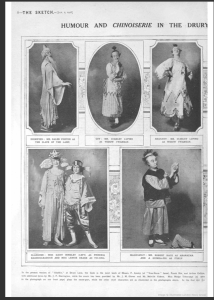
The Sketch – Wednesday 02 January 1918 Image © Illustrated London News Group. Via the British Newspaper Archive.
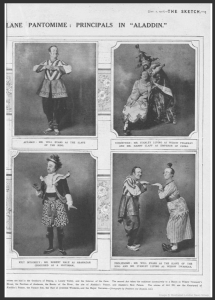
The Sketch – Wednesday 02 January 1918 Image © Illustrated London News Group. Via the British Newspaper Archive.
At night I dined with Col. Campbell at the Savoy Hotel. He was in great form, and gave me a wonderful dinner. Afterwards he took me to see a revue “Cheep”, which was very good.”
If you have been following our diary you will remember that on 16th December 1916 Douglas was summoned for duty at Perth Military Hospital and he stayed there until 8th February 1917 when he was sorry to leave.
Julian the Tank was one of 6 Mk iv male tanks despatched to towns and cities throughout the UK in an attempt to raise funds through donations and the purchase of War Bonds. This was against the backdrop of the introduction (apart from the abortive attempt by Haig at the Somme in 1916) of Tanks at Cambrai, only a few weeks previously to great effect.
It was a massively successful exercise and raised enormous sums of money in a very short time. Former Prime Minister and current Foreign Secretary Arthur Balfour and others stood on top of the tank and gave impassioned speeches. During the week on display at the Mound in Edinburgh £4,764,639 was raised. Glasgow raised over £14 million! In today’s money the amount raised in Edinburgh is approximately £380 million. Julian the Tank was named after General Julian Byng.
Douglas had previously dined at Gatti’s in September 1917.
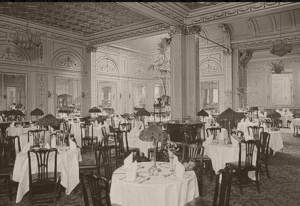
Pictures kindly supplied by Chris Penna of Gatti House.
“Cheep” had opened at the Vaudeville Theatre on the Strand on 26 April 1917 and ran for 483 performances. As the Vaudeville is just across the road from the Savoy Hotel we are assuming that it was still at this theatre when Douglas saw it in January 1918 but if anyone knows different please let us know.
We hope to add more to this post soon once some computer issues have been sorted out.
31st December 1917 Monday
A whistle-stop visit to London
All material produced or reproduced here and throughout this work is the sole copyright of the author and the family of Doctor D.C.M. Page MC
“The leave boat sailed next day (31st) at 10.30 a.m, and was very crowded. Another leave boat, and a hospital ship accompanied us across. The sea was rough, but I didn’t feel the least bit squeamish. We got into Folkestone about noon. I lunched on the Pullman en route for London, which was reached at 2.15 p.m. I tubed it across to King’s Cross, and deposited my baggage in the left-luggage office. Then I did some shopping after obtaining some money at Holt’s. The shops looked fine, and the streets were crowded. I also went to the Palladium (1st house), and saw ‘Little Tich’, Bransby Wlliams, Neil Kenyon, Ernie Lotinga etc. It was a fine show. I caught the 11.30 p.m. train from King’s Cross for Edinburgh. Managing to wangle a sleeper, I passed into the New Year – asleep! Thus began a great leave which was extended to seventeen days so that I might receive my Military Cross from H.M. King George at Buckingham Palace.”
Holt’s, founded in 1809, still provide banking services for the military from their base in Farnborough. They are today part of the Royal Bank of Scotland. In 1992 the London branch merged with Drummonds at Charing Cross.
The London Palladium opened on Boxing Day 1910 with a variety show. Charles Gulliver managing director at the time of Douglas’s visit had been managing the theatre since 1912 and directed a string of successful productions.
We think Douglas may have been mistaken about seeing the first house as it would be impossible to have visited both King’s Cross and Holt’s and then arrived at the Palladium only 15 minutes after getting off the train at Victoria. The second house would have been a better fit for his timetable.
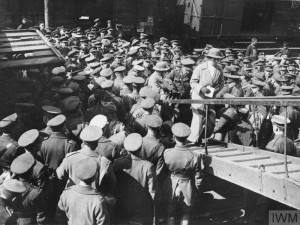
Officers waiting for the leave boat at Boulogne, 3rd April 1916. Copyright: © IWM. (Q 504) Original Source: http://www.iwm.org.uk/collections/item/object/205077558
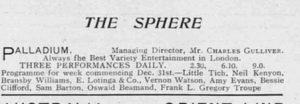
The Sphere – Saturday 05 January 1918 Image © Illustrated London News Group via the British Newspaper Archive.
Find out about our connection with Dr Page and an introduction to his diary here
